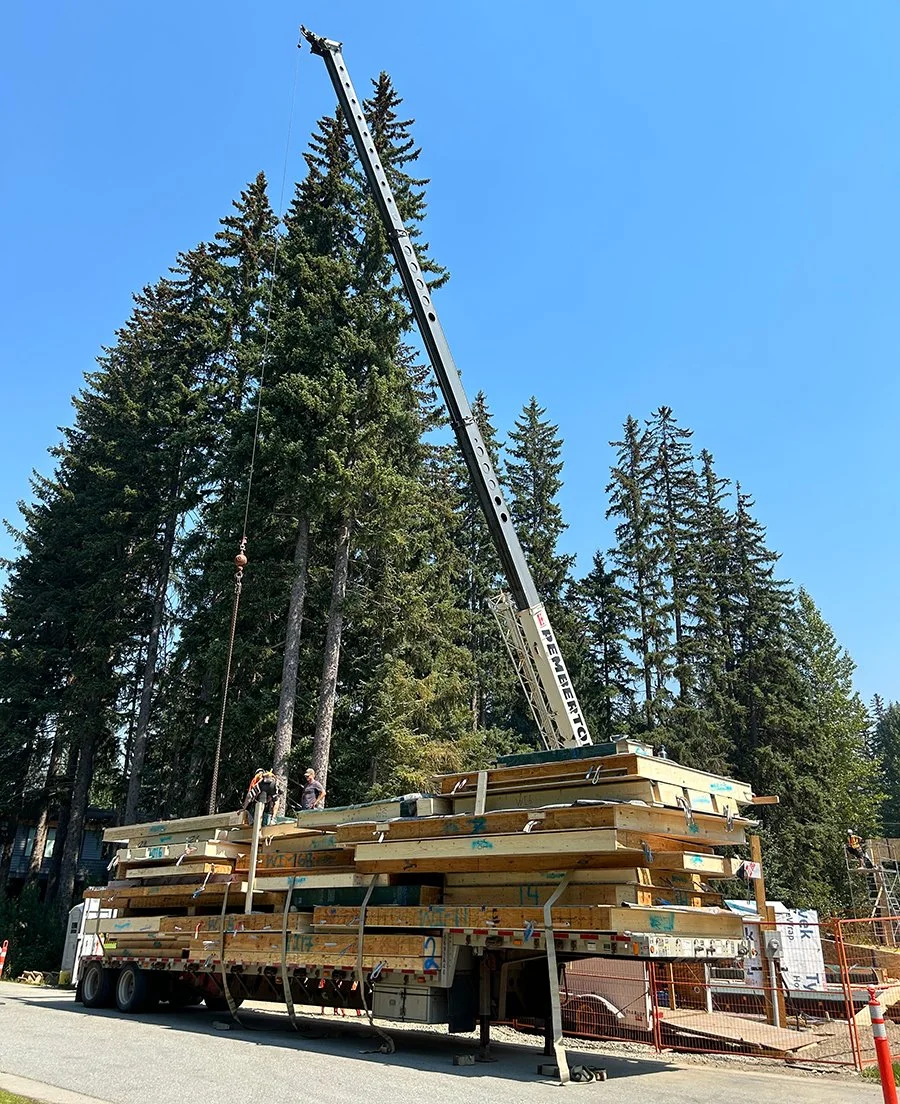Why Is Prefabricated Construction Valuable for Custom Home Builds?
A custom home build is a hefty investment—and you want to enjoy it as soon as possible. That said, it’s understandable you’d do anything to get your project done on time, but not at the expense of the home’s architectural or structural integrity, right?
We thought so, which is why we incorporate prefabricated construction into our custom home builds, when warranted. Prefabricated construction can maximize your project’s budget and speed up the timeline while enhancing the quality of your home’s design at the same time. Sounds too good to be true? It’s not—keep reading to learn more!
What Is Prefabricated Construction?
Prefabricated (or “prefab”) construction describes constructing some building materials, like walls and roofing materials, in a controlled, indoor environment before delivering them to the building site.
In the factory, the manufacturer will design, engineer, measure, cut, and assemble each piece to the unique specifications of each custom home build. Then, each piece will be shipped or delivered to the job site, where the installation team can install it.
Is Prefabricated Construction the Same as Modular Construction?
Many homeowners wonder if prefabricated construction is the same as modular construction, and our answer is no—not technically. While prefabricated construction describes assembling certain materials before delivery to the job site, modular construction describes creating building blocks, or entire “chunks” of the building, before delivering them to the installation site.
So, while all modular projects can be considered prefabricated construction, not all prefab projects are modular. Modular construction is commonly used for large projects with less customization, like apartment complexes, hotels, and corporate buildings, while prefabricated construction is better for projects with more detailed elements, like custom home builds.
Benefits of Prefabricated Building Materials for a Custom Home Build
Prefabricated construction for custom home builds in Whistler, British Columbia has the following benefits:
Quicker Installation
There are several ways that prefab construction can speed up the building process. First, the prefabricated elements of the building can be constructed in a factory at the same time as the site work (like excavation, foundation, and utilities) is being completed.
Insulation can also be installed in prefabricated panels in the factory thereby eliminating the need to do so on site, further shortening the project timeline.
Then, when the prefabricated components arrive, it is super easy to install them since they have been designed to fit together seamlessly. This means that the installation crew can complete your custom home build more accurately, faster, and with fewer hands “on deck” with prefabricated construction vs. traditional construction. Add to that, the fact Mother Nature is taken out of the equation, delays due to weather and environmental impacts are reduced significantly.This allows you to move into your home more quickly!
Project timelines are further reduced by utilizing a factory labour force which in this day and age helps to address a major factor in the industry, that being shortage of skilled workers. Being able to break the construction project down into manageable component assembly tasks helps reduce the need for skilled labour and ensures the components are assembled when needed.
Cost Savings
Just like time savings, there are several ways that prefabricated construction can reduce the cost of your project. First, transporting building materials from one location (the factory) to another (the job site) is more cost-effective than transporting separate components to the job site from multiple locations.
Building in Whistler is building in the mountains. The weather is very unforgiving much of the year. Our short construction window lends itself to the cost benefits derived from prefabricated construction. Erecting a building in just a few days versus taking months to site build results in cost savings due to not having to be working during inclement weather when site construction becomes less efficient. And a shorter project timeline results in less overall project costs.
Prefabricated delivery model results in less wasted materials since the materials are specified to the custom design. Lumber offcuts are eliminated.
Installing weather resistive barriers and window/door opening prep is done in a factory in a controlled environment where it can be done more quickly and cost effectively.
Environmental Friendliness
If you want to reduce your carbon footprint during a new home build— prefabricated construction is the way to go. Often, prefabricated materials are made from recycled products.
Additionally, prefabricated construction produces less waste since the products are uniquely designed to fit together in a factory before arriving at a job site.
Quality Control
Building walls, roof assemblies, and other components on site takes more time. Prefabricated materials are created in a factory-controlled setting to guarantee accuracy and quality every time. Then, once they are delivered, they can be installed immediately, so the installation team doesn’t have to contend with storms or unfavorable weather conditions.
Enjoy the Benefits of Prefabricated Construction When Collaborating with Whistler Builder
Do you better understand the unique benefits of prefabricated construction now? We hope so, because we believe this is one of the best ways to maximize the value of a design-build project in Whistler, British Columbia!
Whistler Builder uses prefabricated construction (when warranted) to make the building process more efficient, faster, and streamlined. This is just one of the many elements of our seamless design-build process, which also includes a comprehensive consultation, a customized design, thorough communication, and post-project check-ins.
Learn more about our custom home-building services, and when you’re ready to get started, reach out to our friendly team—we would love to chat with you!



